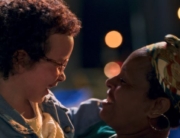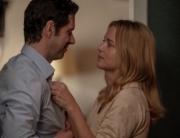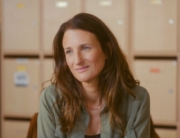Can there be any film genre tougher to pull off than black comedy? Cinema is littered with flops that failed to shake up the right party mix of chortles versus moral rot. French director Pierre Salvadori attempts a subtler version of this chancy category. Let’s call his film a “bleak comedy,’’ where laughs bubble up from slow-building exasperation, inconveniently blurted truth, and the sheer embarrassment of being alive. In the Courtyard pioneers the genre with a no-holds-barred performance from the iconic Catherine Deneuve and rueful points about the burdens of eccentricity before the film careens, pear-shaped and clumsy, beyond bleak and into black.
Morose, drug-sodden singer Antoine (Gustave Kervern) just can’t stand singing anymore, so he blows his last gig. He ends up in the unemployment office, where a comically ditzy bureaucrat hornswoggles him into an interview for an apartment building’s custodian. Shareholder Mathilde (Deneuve) takes a shine to the hulking, inarticulate interviewee, blowing over the misgivings of her skeptical husband, Serge (Féodor Atkine), with quips like, “He’s a bad liar, so much the better,” and “He’s talking to himself? Good, he’ll never get bored.” Is Mathilde witty or just a little off? Serge’s tight-lipped wariness suggests he’s trying to figure it out, too.
Antoine sets about his new job painting and cleaning between toots of cocaine and beer. Oh, and the shock of being beaned by a pear hurled out of a window by the impulsive Mathilde. La grande dame is far from being the only difficult inhabitant of the building, which also houses a fussbudget who spies on other tenants, a shifty thief, and an immigrant New Age cult member with furtive nocturnal habits. For all his naïve awkwardness, Antoine is a soft touch who tries to balance all these characters’ conflicting neuroses and needs. Beefy Kervern uses his rumpled frame and a face that recalls the beast on the old buffalo nickel to communicate resigned acceptance of all the goofy–and pathetic—weirdness he encounters. According to the musical Avenue Q, we’re all a little bit racist, so we’re all a little bit bizarre, too, n’est-ce pas?
Little by little, Antoine establishes a gentle friendship with Mathilde. And little by little, we see that the still beautiful bourgeoise can’t shake an obsession that may or may not be real. Deneuve delivers a high-impact yet nuanced portrayal of a woman bedeviled by extreme inner conflict. Her Mathilde is a warm, charismatic figure who is also needy, klutzy, nervous, and boiling with urges that bring her grief alive with energy she doesn’t know how to use. When a misguided attempt to rally the neighborhood to her latest cause falls flat, we keenly feel Mathilde’s shame and disappointment. We also sense the alarm of the dry, rational Serge, who, fed up with his wife’s caprices, starts to question her sanity.
Mathilde and her neighbors gradually unmask the depths behind their oddities, which, initially played for laughs, seem more painful up close. In the Courtyard makes the point that “harmless” quirks can bring on loneliness, regret, and, most of all, humiliation—an observation that strikes a somber note of pathos.
Just like the black comedy, the bleak comedy requires an instinctive balance. But Salvadori lets his characters and story take wayward turns in the movie’s last quarter that upend the tricky equilibrium between wily humor and abject misery. The emotional and cinematic palettes darken, and terrible fates catch up to characters who abandon self-control and finally snap. However, overblown and out of step events fail to arouse the heartbreak strived for. The film ends on a coldhearted, pat note that rings false and totally unearned.
In the Courtyard starts out as a sly, dicey pleasure with an appealingly nonpreachy message of tolerance. Why does its deflating denouement feel so perverse? Perhaps we’ve been treated to a somehow fitting part of the bleak comedy shtick: letting the audience down.







Leave A Comment